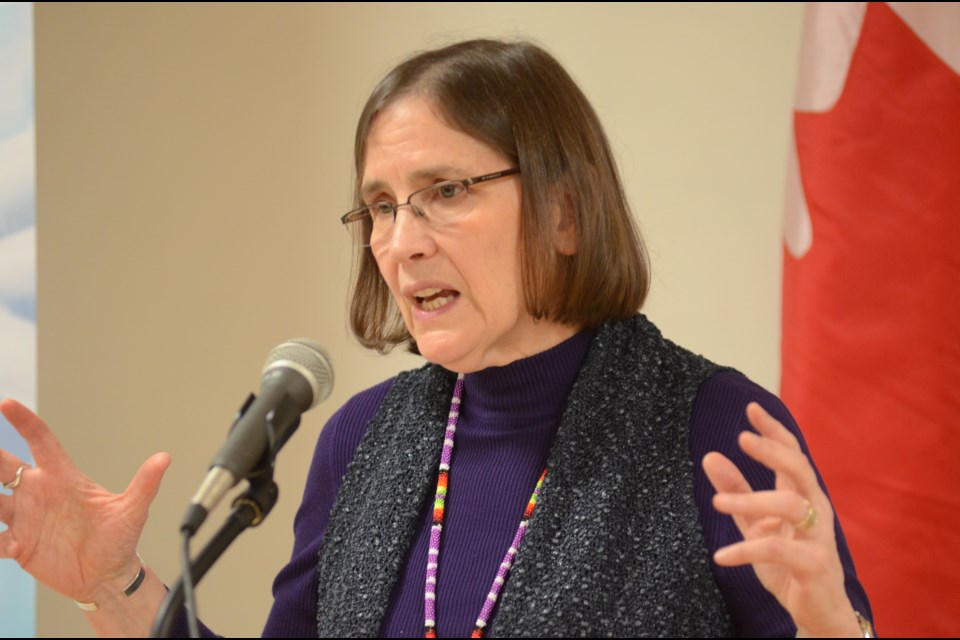Researchers at Health Sciences North Research Institute and Laurentian University are rolling up their lab coat sleeves to tackle dementia among Indigenous peoples.
The Canadian Institute of Health Research is funding two projects — each receiving $500,000 — that will bring new and culturally-adapted approaches to address the needs of Indigenous people living with or at risk of developing dementia.
Rates of dementia among Indigenous people are reported to be 34 per cent higher than the non-Indigenous population and rising more quickly, according to research from HSNRI.
Dr. Janet McElhaney received $500,000 to implement a community-based approach that will combine Indigenous practices with Western technologies to empower caregivers supporting older Indigenous people with dementia.
“It's an important day for HSNRI and all our partners,” McElhaney said during a press conference Monday morning for the funding announcement.
“First Nations populations across Canada are rapidly aging and are at high risk for chronic conditions that lead to earlier onset of disability. What we are also now beginning to understand is those chronic conditions also increase the risk of dementia.”
McElhaney's project, which she deemed MINDCare (Models for Indigenous Dementia Care), will address the individual needs of persons living with or at risk of dementia.
It's a very different approach in that it supports people in their communities, in particular, caregivers. First Nations communities already know how to care for their elders, and researchers want to go into those communities and talk to them about how they can work together to enhance what is already being done, McElhaney said.
“We are going to be working with Elders and health-care providers to set up research teams right in these communities, so we're actually building capacity within the communities to say, how do those communities want to move forward in how they see dementia care advance within their communities,” McElhaney said.
Dr. Jennifer Walker received $500,000 to develop a Canadian Indigenous Cognitive Assessment tool for widespread use and to lay a foundation for a national study on dementia in Indigenous populations.
She said for the last few years, researchers have been working with First Nations and other Indigenous communities to better understand dementia and the impact it will have on those populations. One of the key things they are hearing is dementia and other age-related issues are an increasing concern for those communities.
“We know there are challenges with diagnosing dementia, and the statistics might even be an under representation of the extent of dementia on those populations,” Walker said.
The assessment tools that are currently used to assess how well someone's cognitive abilities are functioning do not work as well in Indigenous populations, she said.
“We hear this from physicians, home-care nurses and from families,” Walker said. “This is concerning, especially with the increased aging in Indigenous populations.”
To prepare for that increase, there are two research priorities, she said. One is the development of the community-based models of care, being undertaken by Dr. McElhaney, and the other is to develop a culturally-adaptive tool to assess cognition and diagnosing dementia.
Walker's project will include an extensive process to adapt language, world views and cultural approaches to assessing memory and brain function.
“Then we'll test that tool to ensure it is assessing memory and brain function in ways that are culturally safe and meaningful, and that it's assessing what it's supposed to be assessing so it can be reliably used in different populations.”
Dr. Carrie Bourassa, scientific director, CIHR Institute of Aboriginal People's Health, said CHRI received many outstanding applications for this funding, and HSNRI's selection is a testament to the enormous potential for their research program, and the potential to truly improve the lives on Indigenous people living with dementia.
CHRI supports research on the latest preventative, diagnostic and treatment approaches to Alzheimer's disease and related dementia, she said.
“Working in collaboration with researchers here in Canada and around the world, our goal is to find an effective treatment or cure for dementia by 2025,” Bourassa said. “These two research projects will play an important role in that global effort, and together, they will contribute to our better understanding of how we can support Indigenous people living with neuro-degenerative disorders and bring us one step closer of our ultimate goal of finding an effective treatment for dementia.”
